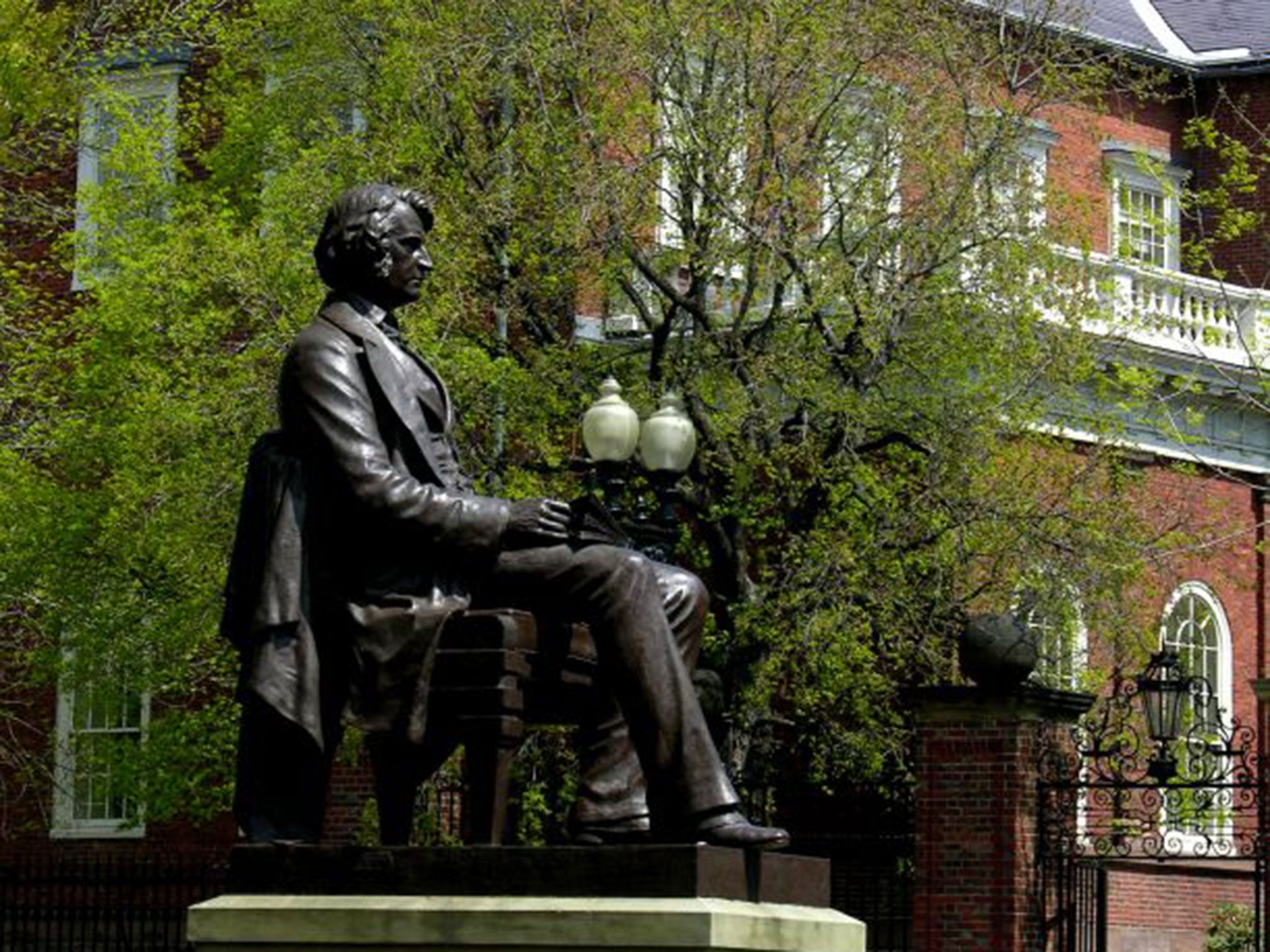Will The Minerva Project - the first 'elite' American university to be launched in a century - change the face of higher learning?
The university has no lecture halls, no debating societies, no sports teams and no fraternities. Instead, the 33 students who have made the cut at Minerva, will travel the world and change the face of higher learning

Your support helps us to tell the story
From reproductive rights to climate change to Big Tech, The Independent is on the ground when the story is developing. Whether it's investigating the financials of Elon Musk's pro-Trump PAC or producing our latest documentary, 'The A Word', which shines a light on the American women fighting for reproductive rights, we know how important it is to parse out the facts from the messaging.
At such a critical moment in US history, we need reporters on the ground. Your donation allows us to keep sending journalists to speak to both sides of the story.
The Independent is trusted by Americans across the entire political spectrum. And unlike many other quality news outlets, we choose not to lock Americans out of our reporting and analysis with paywalls. We believe quality journalism should be available to everyone, paid for by those who can afford it.
Your support makes all the difference.Silicon Valley has a famously rocky relationship with higher education. While many of the brightest minds in the tech industry were educated at prestigious universities such as Stanford and Harvard, many more take pride in having dropped out of their degrees to pursue start-up glory, including Steve Jobs, Mark Zuckerberg and Bill Gates. Peter Thiel, the co-founder of PayPal, is so disdainful of university education that he established a fellowship offering several young people $100,000 (£60,000) per year to drop out and start a company instead.
Ben Nelson, the 38-year-old former CEO of the online photo firm Snapfish, is as sceptical as his peers of the classic American college experience. "Too much time at college is spent on disseminating knowledge which is already freely available," he says. "Too much money is spent on costs that have nothing to do with student outcomes, like lavish campuses and sports programmes. There's too little focus on actually educating students – and too much on maintaining the job security of their professors."
Yet Nelson has taken an even more radical approach than Thiel to reforming what he believes is a flawed but fixable higher-education system: he has created his own university from scratch. The Minerva Project, which expects its first intake of 33 undergraduates to begin their studies in San Francisco this autumn, barely resembles a traditional university. For starters, there will be no lectures – all the teaching will take place in intensive, interactive seminars, many conducted online using Minerva's specialised video-conferencing system.
After their freshman year in California, the student body will be split into several groups and sent to spend each of their remaining six semesters (a total of three years) in a different world city, cycling through Buenos Aires, Berlin, Hong Kong, London, New York and Mumbai. Though they must go without many conventional college pleasures – fraternities, sports teams, debating societies – Minerva undergraduates, says Nelson, "will get to live in the greatest cities on the planet".
Billing the project as "the first elite American university to be launched in a century", Minerva's founder says that its curriculum is "designed to train those individuals who will create or run the major institutions of the world. We don't necessarily know how to teach you to be a better orthodontist or a better tax accountant. We innovate in teaching you how to think, how to be creative, how to communicate effectively – and how to lead."
Nelson's ambition is to create not only a functioning new model for university education, but a university to rival the Ivy League. "The primary motivation is to impact systemic change in higher education on a global basis," he says. "The only way to do that is to come in at the top. If you create a perfectly OK university that does things differently, nobody cares. In higher education, everybody looks up."
Professor A C Grayling, who in 2011 left his teaching position at Birkbeck, University of London, to found an independent undergraduate college, the New College of the Humanities, says Nelson's is a welcome addition to the higher-education landscape. "The global middle class has mushroomed over the past half century and yet elite higher education has scarcely expanded at all," Grayling explains. "There's massive demand for good-quality, high-end education and the world is hungry for innovative institutions."
Minerva, says Grayling, "brings attention back to the people who count most: the students themselves. It's predicated on the idea that we are a global world, and it's about preparing people for a very complicated century."

Nelson comes from a family of academics: both his parents are scientists; one of his sisters is an art historian, the other has a PhD from Stanford's business school. Though resolved to avoid an academic career, he became obsessed with the failings of modern higher education while taking a course in the history of universities during his first year at the University of Pennsylvania. As the chairman of Penn's student committee on undergraduate education, he spent his remaining time there attempting to reform its curriculum. "I received very positive feedback for my ideas, but then was immediately told that they would never be implemented," he recalls.
Somewhat disillusioned, he departed for the West Coast, where he spent 10 years working at Snapfish, five of them as its CEO. Under his leadership the firm grew into the leader of a crowded market, and was bought by Hewlett-Packard in 2005 for a reported $300m. By the time he left in 2010, Nelson felt sufficiently confident to contemplate creating a new kind of university – taking the same approach as a tech start-up. Two years later, the Minerva Project secured a whopping $25m in seed funding from the Silicon Valley venture capital firm, Benchmark.
Meanwhile, Nelson persuaded Professor Stephen Kosslyn, the former Dean of Social Science at Harvard, to come on board as Minerva's founding dean. With Professor Kosslyn's help, he has assembled a formidable faculty across the five "concentrations" from which Minerva students will eventually be awarded BA or BSc degrees: natural sciences; computational sciences; social sciences; arts and humanities; business.
The annual tuition fees for Minerva students are set at $10,000, a fraction of the approximately $44,000 currently demanded by Stanford and Harvard. A third of this year's first Minerva cohort are also receiving financial assistance in the form of grants and loans. Yet Nelson insists that the institution will be sustainable without any further big investments, as soon as it attracts enough undergraduates – he is aiming to build a typical Ivy League-sized student body of between 7,000 and 10,000.
"We can deliver a higher-quality education in a sustainable fashion for a quarter of the tuition costs of a traditional university, because we strip out all of those costs that don't benefit the student," he says.
The project received almost 2,500 applications for the founding Minerva class, and Nelson insists that those offered places were selected purely on merit. The 33 who are headed for California in the coming months hail from 13 different countries and five continents. Only 20 per cent are American. Almost two-thirds are female. Though most will arrive directly from secondary school, several have dropped out of other prestigious universities to switch to Minerva.
"They're a spectacular group of kids," Nelson says. "We set an outrageously high bar: students that didn't make the Minerva cut wound up matriculating at places like Harvard and Cambridge. We eventually accepted 69 applicants and expected that to yield 15 to 19 students, but in the end almost half of them ended up matriculating. That's a higher rate than five of the eight Ivy League universities. And we were twice as selective as Harvard."
The student's view
By Kayla Human
My friends were surprised when I told them I was going to university. They were less surprised when I told them I was the first person to accept a place at this university. Ever.
There is something unreal about being part of an educational pilot, especially one that will span San Francisco, Berlin, Buenos Aires, Hong Kong, Mumbai, London and New York. I struggle to describe what I will be doing and what process led to this unexpected situation. All 33 founding class members seem to be negotiating this liminal space in which we are committed to Minerva's potential but unsure of its reality.
I make no pretences, there are aspects of Minerva that unnerve me, such as its emphasis on self/peer-teaching and how its seminars are virtual. Most people I consulted were cautious of Minerva's novel method and, of course, my parents had qualms of their own. So why go? Why was Minerva the only university that I applied for?
Our education system needs to change. And I don't mean in the form of ex-Education Minister Michael Gove's personal tribute to "the good old days". We need to tear it from national interests and start respecting the rights of young people to emerge as independent thinkers. At 17, I was so disillusioned with school that I effectively left to study in less oppressive environments – using London as my classroom. I felt disinclined to apply to the Russell Group universities, sceptical of their underlying conservatism. Surely, institutions at the forefront of human knowledge should be updating themselves according to their expert findings? There is an entire branch of academia focused on the science of learning, which remains largely unapplied.
This is what Minerva promises – a contemporary education, not only in its deployment of technology to its full pedagogical potential but in its meta-attitude of people as global citizens, encouraging learners to transcend divisive and narrow national constructs. My enrolling at Minerva is my joining the movement for radical change in education. In September, I, one of 33 people from 13 countries (and one of two from the UK), will arrive in San Francisco, and I expect we'll be a feisty bunch. Aware of our responsibility and privilege as Minerva's founding class, we will no doubt be just as challenging to it as we are committed to our collective mission."
Join our commenting forum
Join thought-provoking conversations, follow other Independent readers and see their replies
Comments